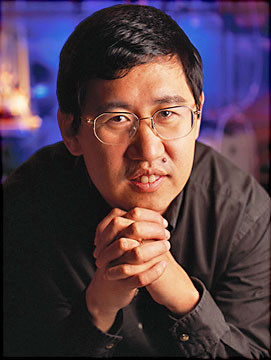Binghe Wang, Ph.D.
Drug Discovery and New Diagnostics
Georgia State University
Recruited: 2003
Binghe Wang seeks new insights into how pathogens and diseases function, so that he can develop tools to find them earlier and stop their attacks on the body.
More precisely, Wang studies the molecular signature of cancers, hoping to facilitate earlier detection – the most important element in cancer treatment. His work includes the design of new MRI contrast agents that identify cancerous tissue at earlier stages. Complementary research targets quick identification of pathogens, early knowledge that is valuable for both health and public safety.
Other research in Wang’s lab aims to outwit drug-resistant bacteria. One way that these dangerous pathogens defeat the medicines used against them is by pumping drugs out of their cell walls; this lowers the drug’s concentration, enabling bacteria to survive and proliferate. Wang is working on inhibitors that will prevent the pumping action inside pathogenic cells, so that drug therapies can work.
Research
- Drug design (medicinal chemistry):
- Anti-cancer drugs: HIF-1a inhibitors, targeting DNA for anticancer applications, inhibitors of MDM2-MDM4 dimers and dimerization, and new anti-cancer prodrugs
- Anti-infective drugs: bacterial quorum sensing inhibitors, design and synthesis of SecA inhibitors, anti-parasitic diseases (PDEC inhibitors against T. cruzi)
- Anti-inflammation drugs: PDE4 inhibitors
- Drug delivery (pharmaceutical chemistry):
- Prodrugs: Peptide prodrugs, receptor-mediated prodrugs
- Targeted drug delivery: receptor-mediated drug delivery, biomarker-mediated drug delivery
- Molecular recognition and new diagnostics (bio-organic chemistry):
- Fluorescent chemosensors and probes: sensors for carbohydrates, hydrogen peroxide probes, hydrogen sulfide probes
- Lectin mimics for carbohydrate biomarker recognition
- Boronic acid chemistry: new fluorescent boronic acids, boronic acid-based chemosensors
- Imaging mass spectrometry
- New fluorescent imaging agents for cancers
- Modified DNA in sensing applications
- New organic reactions (organic chemistry):
- New “click” chemistry development
- New methods for DNA modifications
- New linker chemistry
- New photo-affinity labeling chemistry
Choosing Georgia
Wang was attracted to Georgia by GRA’s investment in higher education research, as well as the collaborative, interdisciplinary environment at Georgia State.

